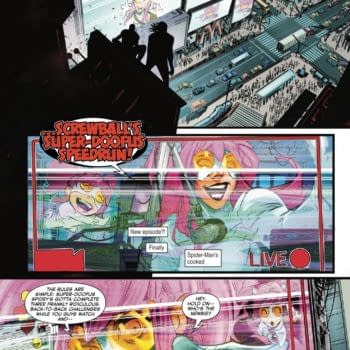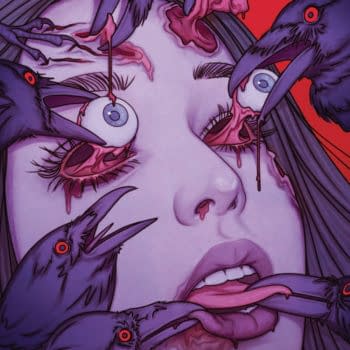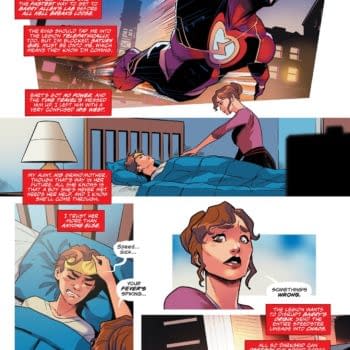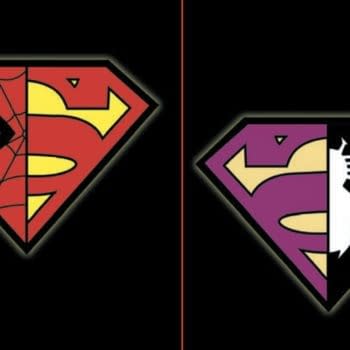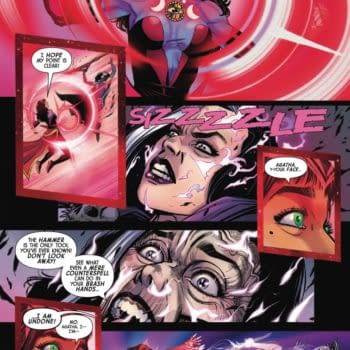Posted in: Comics | Tagged: Comics, dynamite, entertainment, Ian Flemming, james bond, jason masters, Vargr, warren ellis
Warren Ellis Will Be Writing James Bond For At Least A Year

CB: What's the definitive Bond, as you see it–that is, which book typifies the quintessential Bond for you?
WE: Mid-to-late period Fleming. I don't know that I would pick out a specific book, not least because Bond the man clearly becomes a work in progress after Casino Royale.
That is by far the most interesting Bond, for me — the man whose job is killing him.
CB: The Bond novels were also less gadget-oriented, less focused on spectacle, and often very dark. Are you drawing from the novels for the inspiration for your series?
WE: This commission is via the Ian Fleming Estate, to specifically write the Bond of the novels. This is, by design, not the cinematic Bond. So, yes. Not that I could resist doing a Bond cold-open: but it's a duel using construction materials in a building site in Helsinki in the middle of the night. So, yeah, you have it. There are, depending on your perspective, a couple of gadgets in there, but Bond doesn't have them. For part of VARGR, he doesn't even have his (updated) Walther.
CB: You're presenting Bond as a contemporary spy; how do you adapt the character from a hero who epitomized the post-WW2 / Cold War era that Ian Fleming wrote about? Fleming seemed to have built a meticulous (albeit occasionally contradictory) timeline for Bond that was largely built around the role of the British government as a major world power in the 1940s through the 1960s. How do you make that play against today's changing global politics?
WE: I'm using the age-45 frame, certainly, and my Bond probably has ten years left in 00. I'm carefully *not* revealing a meticulous new timeline for a contemporary Bond — I have much of one in my head, but we will only see elements of it as and when they become necessary to telling my stories in a clear and direct way. And that hasn't been required yet.
The nature of Bond's role in the world hasn't really changed. Fleming was certainly responding, in several ways, to the end of the British Empire — sometimes in fantastical ways, sometimes, I think, in melancholy ways. Sometimes there was denial, sometimes acceptance. Which is entirely apt, because any secret intelligence service has to believe it serves a need. It was coming, in the 50s and 60s — Britain as a smaller thing in a bigger world. I can pursue that while remaining realistic about Britain's lack of real importance on the world stage.
CB: What's the plot line of your first arc, VARGR? Where does the name come from?
WE: Well, that's probably a function of where we are as an audience in 2015. Explaining the plot in an interview, for me, defeats the purpose of writing the book. The basic premise is all you need: Bond takes on a case left by a deceased fellow 00 agent, which leads him to consult in Berlin with the wealthy, brilliant medical inventor Slaven Kurjak in pursuit of an agile and high-tech drugs operation — and then it all goes wrong.
And, for a Bond aficionado, this: Fleming didn't really deal with criminal narcotics in any sustained way — I want to say RISICO (which I nearly called this story) was the only one that touched on it, and that was a short? I like to think that a Fleming working in a later period would have written in a significant way about drug crime.
CB: Fleming took Bond all over the globe–will we see similar international intrigue in your Bond storylines? I know you mention Helsinki & Berlin for the first issue/arc–does his mission take him further afield than that?
WE: To the Norwegian coast. I decided I wanted a cold story, for the first one — and god knows winter in Berlin is brutal. Also, when Fleming was writing, the locales were difficult for ordinary people to reach, which added to their exoticism. These days, most of them can be reached by Easyjet or Ryanair from a regional airport. In VARGR, I can get the same exoticism from the atemporal strangeness of East Berlin, which still looks like a Communist district, and from places like remote Norwegian islands that are comparably difficult to reach. And Helsinki's in there because I just wanted somewhere Brutalist and miserable, which chunks of Helsinki certainly are. I couldn't bring myself to take Bond to Helsinki's black metal karaoke bar.
CB: What core members of Bond's supporting cast are you utilizing? Are you introducing any new recurring members in your run?
WE: I'm retaining the necessary ones: M, Moneypenny, Bill Tanner and, of course, Major Boothroyd – not least because the real Boothroyd was such an eccentric. Right now — and this could change, obviously — I feel no need to introduce new recurring characters. I'd kind of like to use Felix Leiter at some stage — there's a whole bunch of interesting stuff to unpack with that character.
CB: Seen through a contemporary lens, Bond comes across as misogynistic at times (although it can be argued that he reflected some of the attitudes and mores of his era, although even there Bond was more amoral than the norm); how do you deal with that misogyny in a modern series? Is it an inherent part of Bond's nature, or are those who categorize Bond as misogynistic misreading what Fleming was portraying with the character?
WE: A lot of this, of course, is about postwar British mores: many of them were still around when I was growing up in the Seventies. The attitude to people of colour, the notion that lesbians really just needed a good seeing-to to fix them… all depressingly familiar. Contemporising Bond, for me, requires the writer to move that baseline — on a simple level, it was possible for the Bond of CASINO ROYALE to have grown up with those views inculcated into him, because Bond was conceived of as an "ordinary" man, but the Bond of VARGR could not have grown up like that.
All that said: yes, I believe there to be a streak of misogyny in Bond, but I think a contemporary reading exposes much (but not all) of that as misanthropy. I suspect Bill Tanner is Bond's one single friend.
CB: How long are you on board for this series? How far ahead have you plotted?
WE: Right now, I'm on board for a year. I'm in the middle of finishing up VARGR, which is the first six issues, and I'm far enough ahead that that buys me a couple of months to sit and think about what the next six issues are. After that, either I'll see if I have more to say or see whether or not everyone's sick of me.









